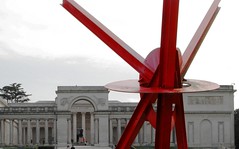 Along with the discussion of respect and time and attention that I just wrote about, Merlin Mann spent a little time talking about what a knowledge worker is and does from his perspective. Time and Attention Talk (Improvised Rutgers Edition).
Along with the discussion of respect and time and attention that I just wrote about, Merlin Mann spent a little time talking about what a knowledge worker is and does from his perspective. Time and Attention Talk (Improvised Rutgers Edition).
I've heard the version of a knowledge worker being someone who defines their work or maybe someone who knows more than their boss. Merlin takes these ideas to a new level. While these aspects of knowledge work are usually seen as a good thing, there is a downside. Knowledge workers sometimes have so little clarity on what they need to do that they let their inbox and calendar define that for them.
This has to change. It cannot be acceptable for people to have so little direction in their work lives to be blown by the waves of email and meetings that blow through their electronic lives. Set aside specific time for things you want to do: email, lunch, Facebook, etc. Do it for that period of time and then move along. Check for "leaks" - those things that drain your time and attention (random emails, meetings with no agenda, cube drop-by interruptions). Work with your colleagues to decide how to handle the trivial interruptions; how to handle major catastrophes. These are things that aren't part of the standard training curriculum. Maybe these things should be in the next generation of "life skills" classes they teach in high school.
So, what is it that knowledge workers need in order to do their jobs? Merlin talks about three key elements to be great as a knowledge worker in the last two minutes of the talk.
- Tolerance to handle ambiguity, the unknown, and the incomplete;
- know that you have enough information to do the work at hand;
- Courage to work within the uncertainty and the lack of information and still do the job.
These are not just black-and-white elements. It's a process. You get to practice working under uncertainty to build more and more courage that your processes work for you and can help you get work done. That's a knowledge worker.
[Photo: "Echo of The Thinker" by Tolka Rover]